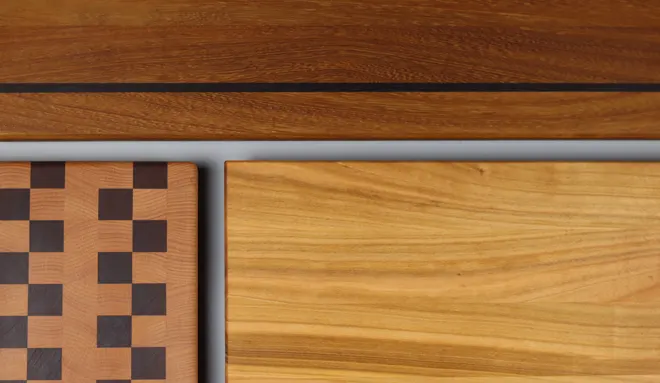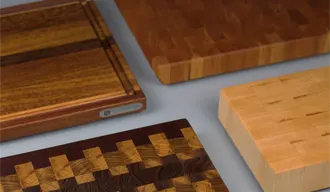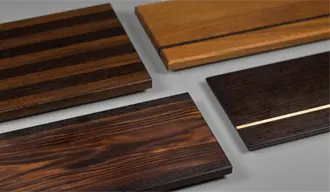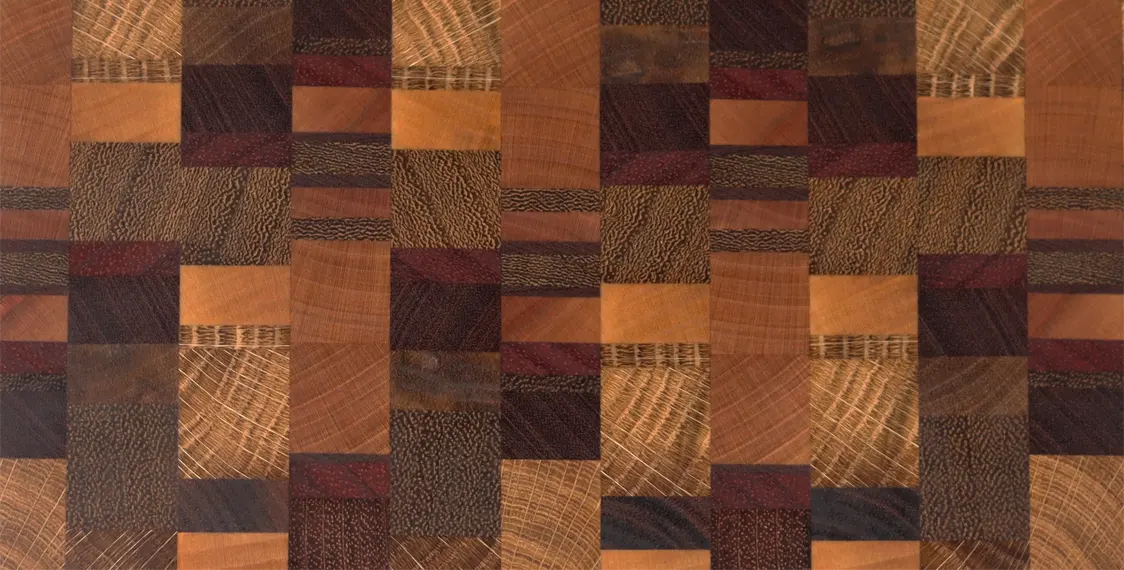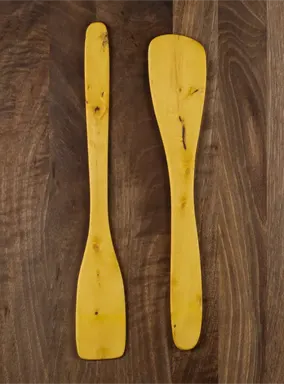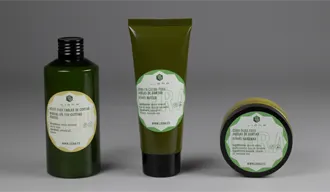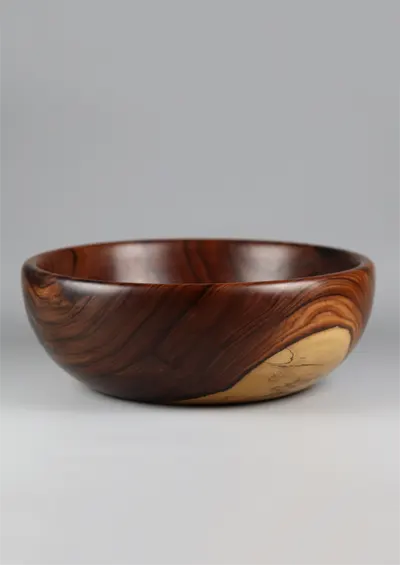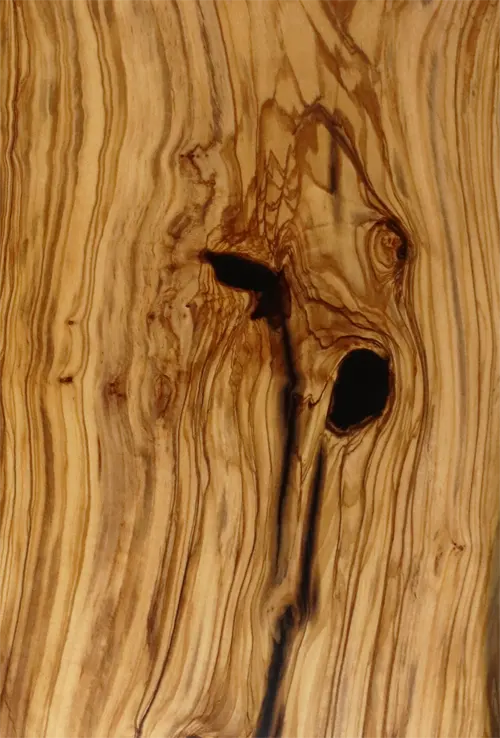What is an end grain cutting board?
In the world of professional and domestic cooking, the choice of the right utensils is essential to ensure efficiency, hygiene and durability.
One of the most essential items in any kitchen is the cutting board. Among the various options available, end grain cutting boards stand out for their superior features and unique benefits.
What is an end grain cutting board?
An end grain cutting board, also known as an end grain or end grain cutting board, is a type of board in which the wood fibers are oriented perpendicular to the cutting surface.
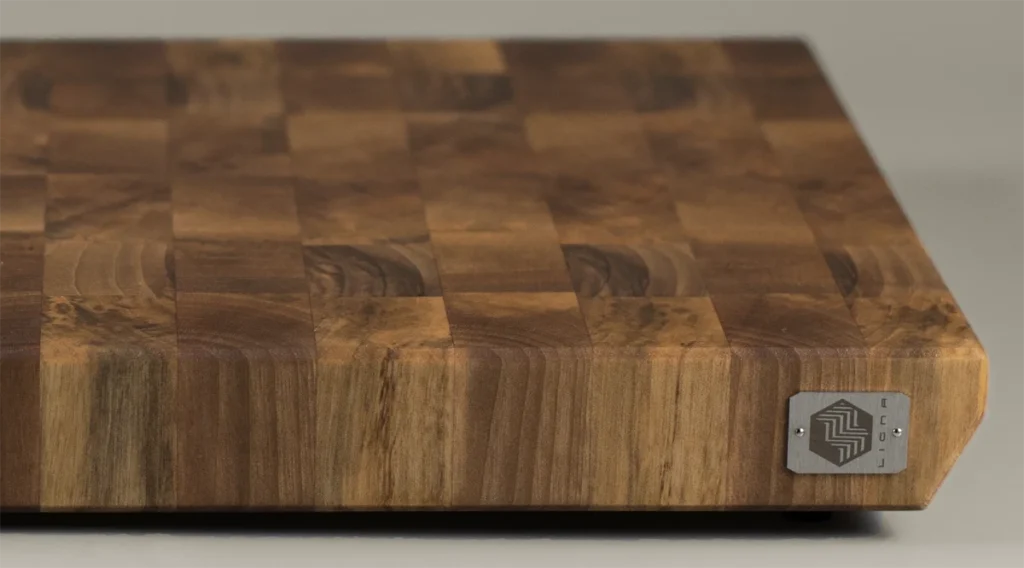
This means that the cut surface shows the ends of the wood fibers, instead of the grain as in the face grain boards.
This orientation of the grain offers several advantages.
- Durability: The arrangement of the fibers allows the board to “close” the cut marks, which prolongs its useful life.
- Care of the cutting edge of knives: When cutting on a butt-jointed board, the wood fibers separate and close smoothly, which reduces wear on the cutting edge of the knife.
- Hygienic properties: The ability of the fibers to close helps prevent the accumulation of bacteria in the cutting grooves.
Advantages of cutting boards
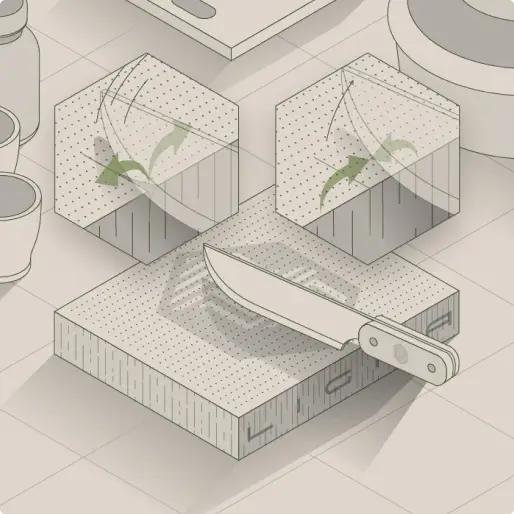
Durability and resistance
End-grain cutting boards are known for their strength and longevity. The orientation of the fibers allows the board to absorb the impacts of cutting without significant damage, making it ideal for intensive use in professional and domestic kitchens.
Care of the cutting edge of knives
When cutting on a face grain board, the wood fibers separate and close smoothly, which reduces wear on the knife edge. This means knives stay sharper longer.
Hygienic and antibacterial properties
The ability of the fibers to close helps prevent the buildup of bacteria in the cutting grooves. In addition, many cutting boards are treated with natural oils and waxes that repel moisture and bacteria, further improving hygiene.
Aesthetics and design
End grain cutting boards offer a distinctive and attractive appearance, showing the growth rings of the wood, making them a popular choice not only for their functionality but also as a decorative element in designer kitchens. This makes them a popular choice not only for their functionality, but also as a decorative element in designer kitchens. Maintenance with wax and oil disguises knife cuts.
Comparison with other types of cutting boards
Face grain cutting boards
Face grain cutting boards have the wood fibers oriented parallel to the cutting surface. Although they are simpler to manufacture and are usually less expensive depending on the wood chosen, they tend to show cut marks more quickly and wear knives more quickly.
Plastic boards
Plastic boards are lightweight and easy to clean, but they can develop deep grooves over time, making them prone to harboring bacteria and depositing microplastics on food. In addition, they are not as knife-friendly as wooden boards.
Bamboo boards
Bamboo is a sustainable and economical option. However, bamboo boards are harder and dimensionally unstable.
Glass and titanium boards
Although hygienic and easy to clean, glass and titanium cutting boards are extremely hard and can quickly damage the cutting edge of knives. In addition, their slippery surface can pose a safety risk during cutting.
Ligna’s cutting board collections
At Ligna, we offer a variety of end grain cutting boards, each designed to meet different needs and preferences.
- PURA : A minimalist and elegant option, perfect for modern kitchens.
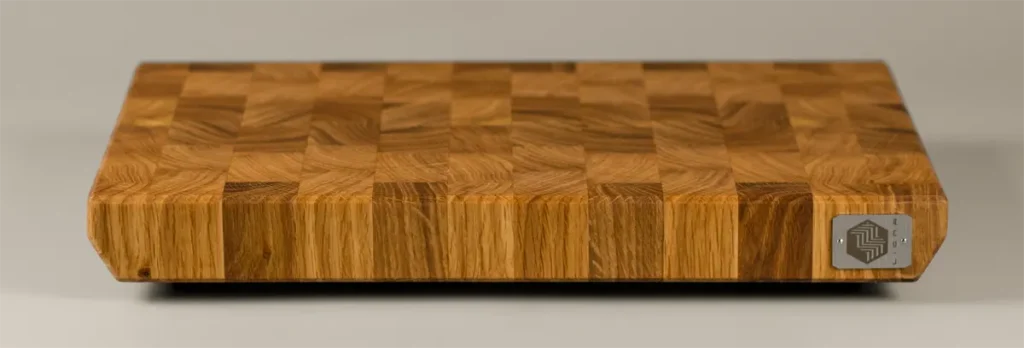
- RUBRA: It stands out for its reddish tone and its eye-catching design, bringing a touch of color to your kitchen.
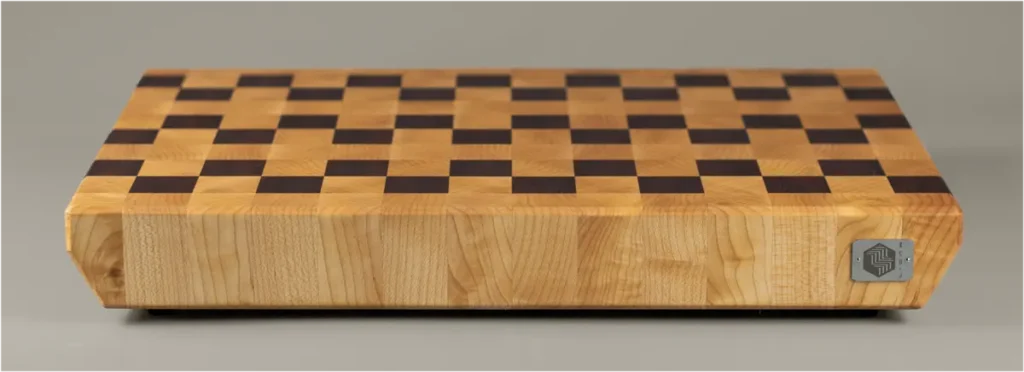
- CALIDA : With warm tones and a soft texture, this table combines functionality and aesthetics.
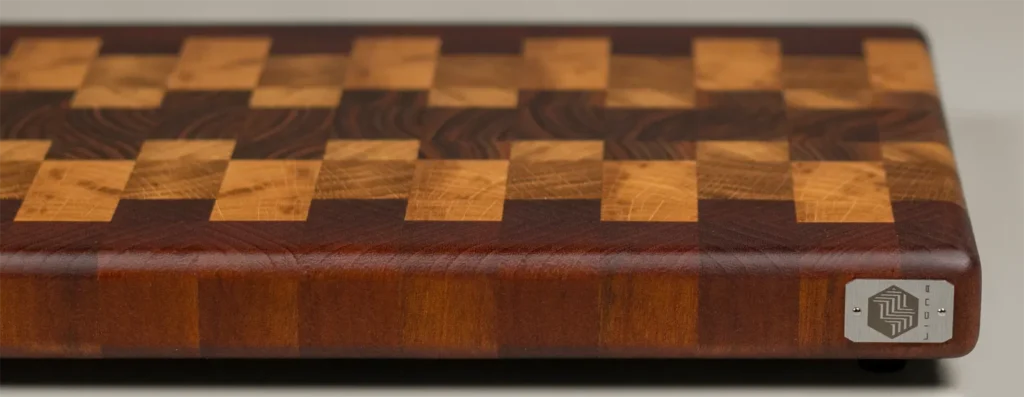
- CHAOS: A unique piece with a bold design, ideal for those looking for a board that is both a tool and a work of art. Each chaotic board each unit is different.

- SPECIAL MAPLE: Made with high quality maple, these boards offer an exceptional cutting surface and a sophisticated appearance thanks to the dark infiltrations of this special hard maple.
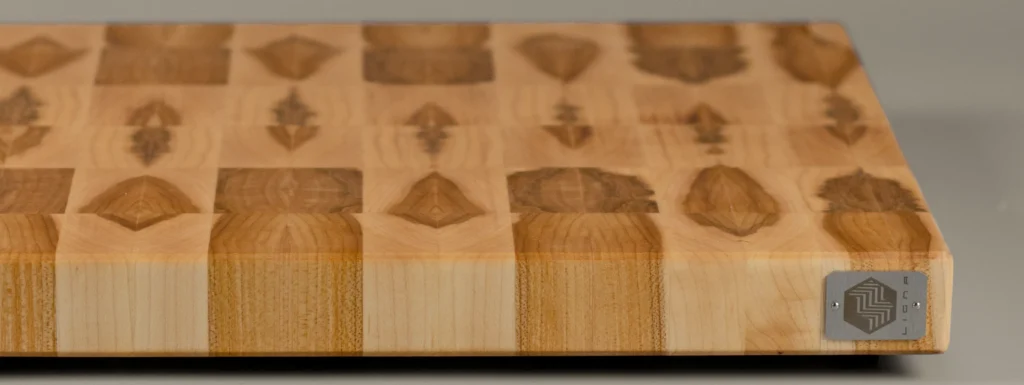
You can explore our complete collection at ligna.es.
Conclusion
End grain cutting boards represent an investment in quality, durability and aesthetics. They offer significant advantages over other types of boards, including greater strength, better knife edge care and superior hygienic properties.
At Ligna, we are proud to offer a variety of cutting boards that combine craftsmanship, functionality and design.
We invite you to explore our collections and discover the difference a testa cutting board can make in your kitchen.
Frequently Asked Questions about End-grain Cutting Boards
What is an end grain cutting board?
An end-grain cutting board, also known as “end grain,” is a board in which the wood fibers are oriented perpendicular to the cutting surface. This arrangement allows the fibers to separate and close smoothly when cutting, offering greater durability and better edge retention.
What are the advantages of an end grain cutting board over others?
End grain cutting boards offer several advantages:
- Greater durability: The orientation of the fibers allows the board to absorb the impacts of cutting without suffering significant damage.
- Knife edge care: Fibers separate and close smoothly, reducing wear on the knife edge.
- Hygienic Properties: The fibers’ ability to close together helps prevent bacteria buildup in the cutting grooves.
What woods are ideal for making end grain cutting boards?
Hardwoods like maple, walnut, iroko, and teak are ideal due to their strength and durability. These woods offer a firm surface that protects knives and resists wear, making them excellent choices for cutting meat.
How should a end grian cutting board be cleaned and maintained?
To keep an end-grain cutting board in optimal condition:
- Cleaning: Hand wash with warm water and mild soap. Avoid submerging in water or placing in the dishwasher.
- Drying: Dry thoroughly with a clean cloth before storing.
- Maintenance: Apply food-safe mineral oil every two weeks and seal with maintenance wax weekly.
Why are end grain cutting boards more hygienic?
End grain cutting boards are more hygienic because the wood fibers close after cutting, helping to prevent bacteria from building up in the grooves. Additionally, many are treated with natural oils and waxes that repel moisture and bacteria.
Are end grain cutting boards suitable for professional use?
Yes, end grain cutting boards are ideal for professional kitchens due to their durability, knife-edge protection, and superior hygiene properties. Their wear resistance makes them suitable for intensive use.
What is the difference between an end-grain cutting board and a face grain cutting board?
The main difference lies in the orientation of the wood fibers:
- End grain board: The fibers are oriented perpendicular to the cutting surface, offering greater durability and care for the knife edge.
- Face grain cutting board: The fibers are oriented parallel to the cutting surface, which can result in increased knife wear and reduced board durability.
Is it possible to customize a end grain cutting board?
Yes, many companies offer customization options for end grain cutting boards, such as engravings or specific designs, ideal for restaurants or as corporate gifts.
Do end grain cutting boards require special maintenance?
Yes, due to their construction and intensive use, end grain cutting boards require more regular maintenance, including the application of mineral oil and maintenance wax to preserve their finish and moisture resistance.
Where can I purchase quality end grain cutting boards?
At Lignwooddesign.com, we offer a variety of end grain cutting boards that combine functionality and design. Explore our collection and find the perfect board for your culinary needs.
Otras entradas del blog
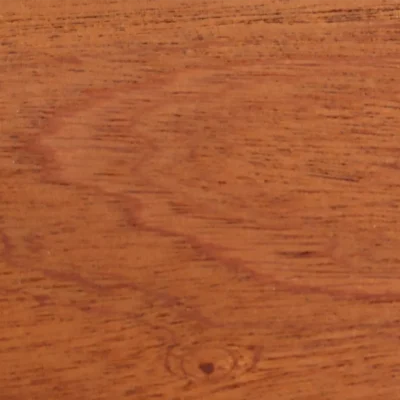
Sapele Wood: Uses and Characteristics
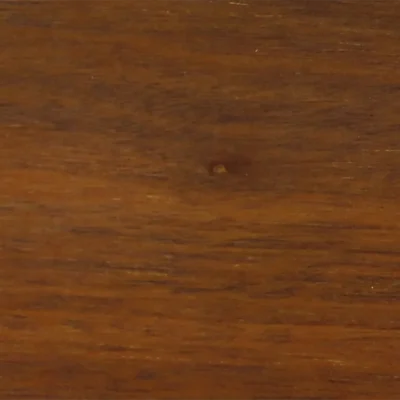
The 10 hardest woods in the world
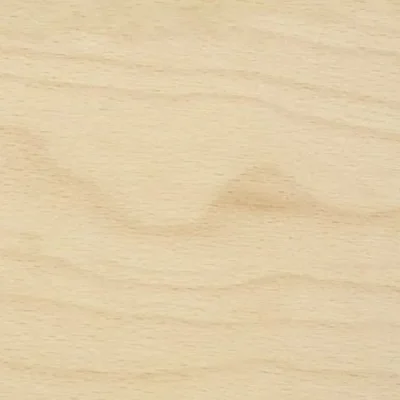
Birch Wood: Uses and Characteristics
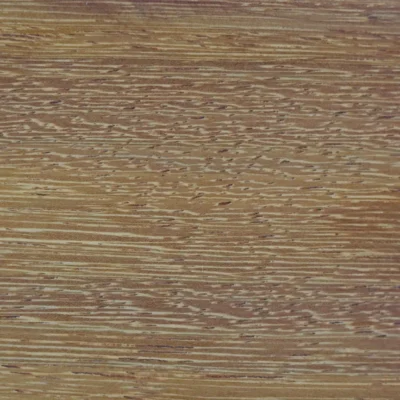
Iroko Wood: Uses and Characteristics
Nuestras tablas de cortar:
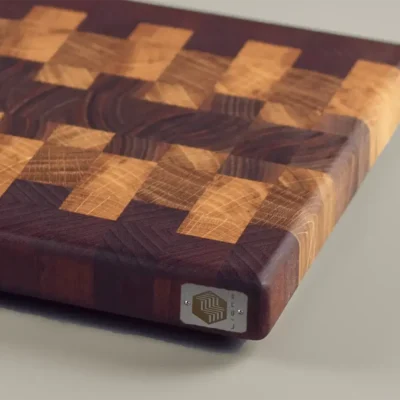
Calida
end grain cutting board
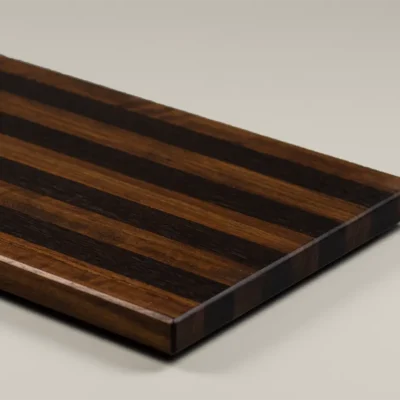
UMBRA
serving board
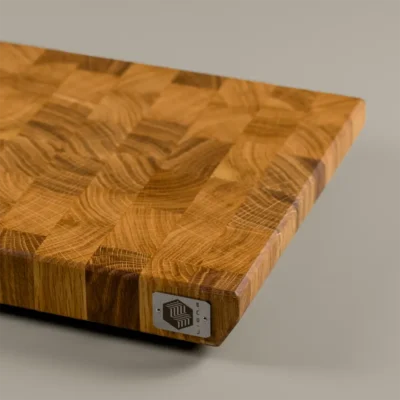
Pura
Oak oak butcher block
Pura
Oakoak butcher block
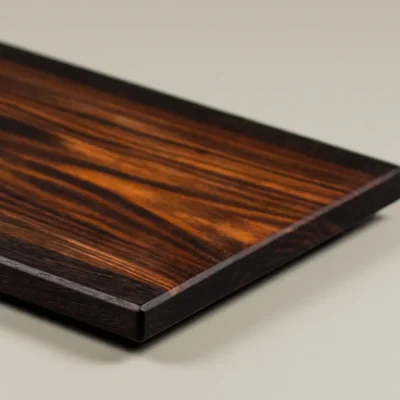
NUBILA
wooden cheese board
